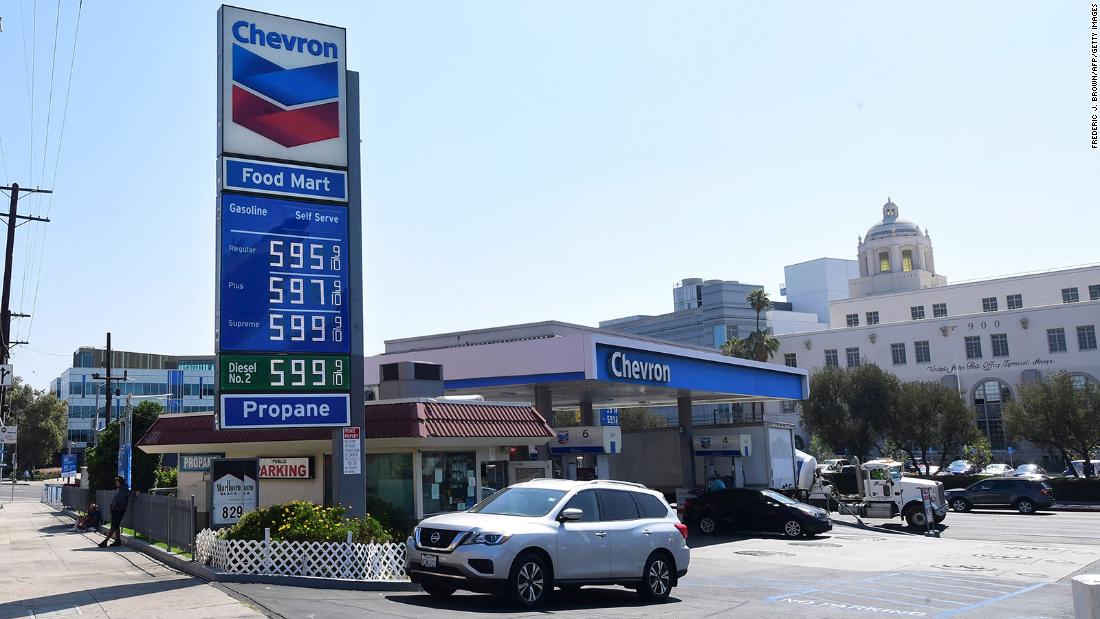
The seven-year high in gas prices is all about supply and demand. Gas was dirt cheap last spring because highways sat empty during the height of the pandemic.
This year's successful rollout of Covid-19 vaccines allowed people to return to the skies and roadways, lifting energy demand as a result. That's a good thing.
The problem is that supply is having a hard time catching up. And Biden doesn't have a magic wand to fix that overnight.
"There's not much in the toolkit," said Tom Kloza, global head of energy analysis for the Oil Price Information Service.
Industry sources say Biden's best bet is to cajole OPEC and its allies, known as OPEC+, to pump more oil. The White House is attempting to do just that by trying to forge a compromise after an expected OPEC+ agreement collapsed on Monday amid infighting between the United Arab Emirates and Saudi Arabia.
"The OPEC discussions which are ongoing, will have a big factor on the price of oil, which has a factor on our gas prices here at home," White House Press Secretary Jen Psaki told CNN's New Day on Wednesday.
Psaki said the Biden administration is in touch with Saudi Arabia, the UAE and others in OPEC+.
"We want to make sure we're doing everything we can to keep the price of gas low," Psaki said.
Analysts suggested the Biden administration was caught flat-footed initially by the importance of the OPEC+ negotiations.
OPEC is the only game in town
Don't expect any all-caps tweets from Biden like the ones his predecessor sent blasting OPEC. But behind-the-scenes pressure, particularly on the UAE, could be effective in breaking the stalemate. And despite its differences with Saudi Arabia, the Biden administration rolled out the red carpet this week when a senior official from the kingdom visited.
Getting OPEC+ to move is key because the group is really the only game in town. No one else has the firepower to quickly ramp up production. OPEC+ is still holding back production it sidelined when Covid erupted last spring.
"The only spare production capacity currently available resides in OPEC+," Paul Sheldon, chief geopolitical advisor at S&P Global Platts, said in an email. "The easiest path to boosting short-term supply (and easing price pressure) would be through negotiations with Saudi Arabia, AUE and their partners."
The United States is an oil superpower in its own right. However, the core group of OPEC pumps more than twice as much oil as the United States. And US output is down by about 2 million barrels per day from the pre-Covid peak.
The situation isn't helped by the fact that the US oil industry is in the penalty box on Wall Street after blowing through insane amounts of money over the past decade.
Investors want oil companies to focus on returning profits to shareholders, not plowing cash into expensive drilling projects that could just oversupply the market once again. US shale oil companies have signaled they aren't coming to the rescue, at least not yet.
Tapping the emergency stockpile of oil?
If oil and gasoline prices get much higher, the Biden administration could decide to tap the Strategic Petroleum Reserve. Yet that emergency stockpile of oil is really intended for a break-the-glass moment, not to ease the strain of economic booms.
"That would be a pretty extreme step," said Jason Bordoff, an energy adviser during the Obama administration. "The SPR is a national security asset for a time of emergency like the Strait of Hormuz being blocked or the Libyan Civil War."
In other words, it's probably too early to be talking about the SPR.
Besides, the United States has already been tapping the SPR to raise money for the federal government. As required by legislation passed in 2015 and 2018, about 16 million barrels have been released between April and June alone, according to Platts.
Another potential lever Biden could pull would be to remove US sanctions on Iran and Venezuela, two OPEC nations whose barrels have been sidelined.
Yet the White House would not want to be seen as caving to sanctioned countries simply because of $3 gas.
"The Biden administration will likely continue to keep these foreign policy issues isolated from domestic gasoline prices," said Sheldon.
The Keystone blame game
Some of Biden's critics have blamed high gas prices on the president's decision, on his first day in office, to rescind the permit for the Keystone XL Pipeline.
Yet that argument makes little sense. Keystone was not even scheduled to begin bringing barrels from Canada until 2023, at the earliest.
"The cancellation of Keystone XL has no current impact to pricing or US supply," said Parker Fawcett, a Platts energy analyst.
Bigger picture, the attention on high gas prices underscores how reliant the US economy remains on fossil fuels despite the climate crisis.
"Once we move beyond the immediate crisis, complacency sets in and people go back to enjoying SUVs," said Bordoff, co-founding dean of the Columbia Climate School.
Bordoff said the most important thing to do is to limit the US economy's oil addiction.
"This is going to happen again and again," said Bordoff. "It's in the national interest, not only because of the climate crisis, but for our own energy security, to reduce oil consumption."
"gas" - Google News
July 08, 2021 at 11:57PM
https://ift.tt/3qTWMQA
Gas prices are above $3. Biden doesn't have a magic wand to fix that - CNN
"gas" - Google News
https://ift.tt/2LxAFvS
https://ift.tt/3fcD5NP
Bagikan Berita Ini















0 Response to "Gas prices are above $3. Biden doesn't have a magic wand to fix that - CNN"
Post a Comment